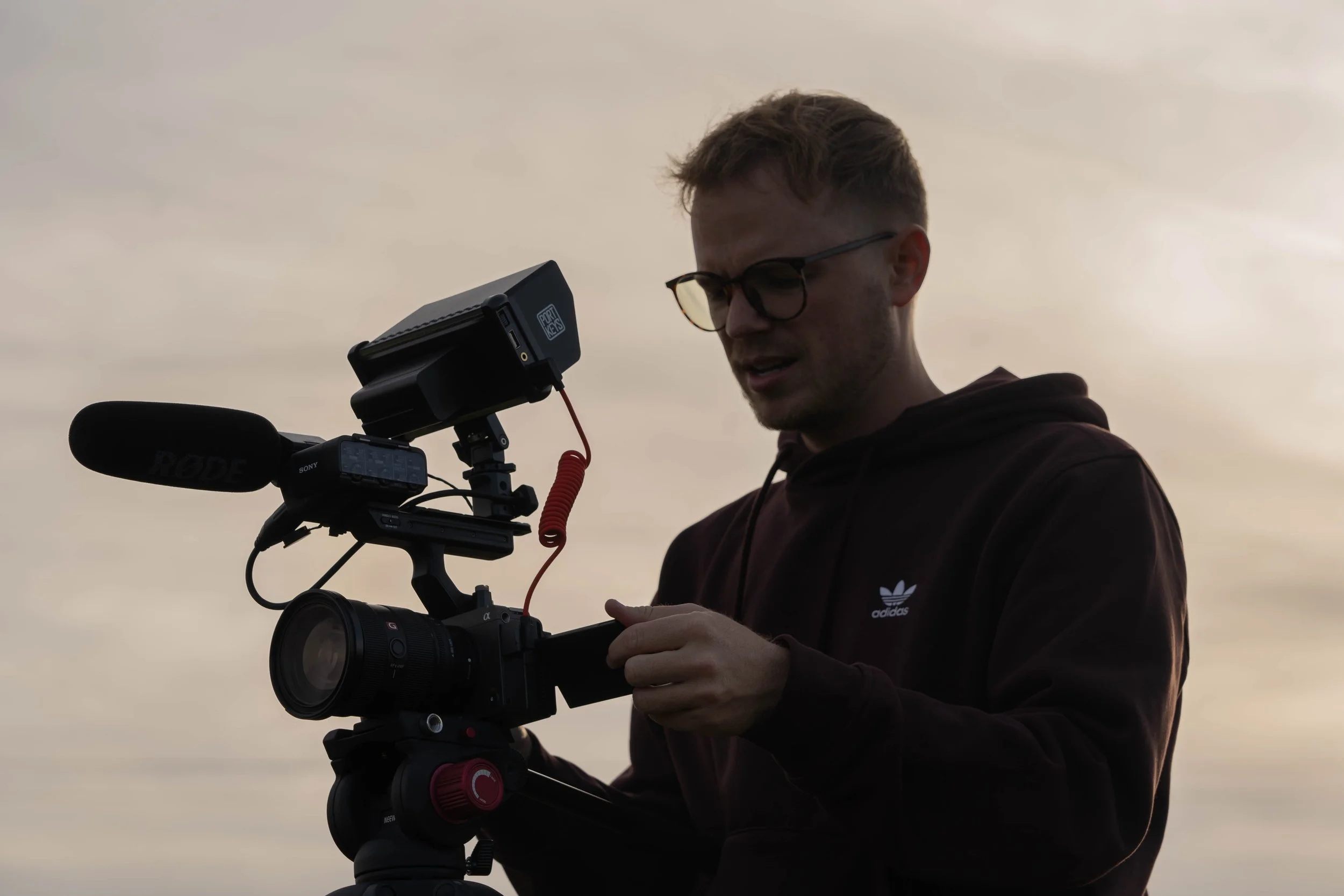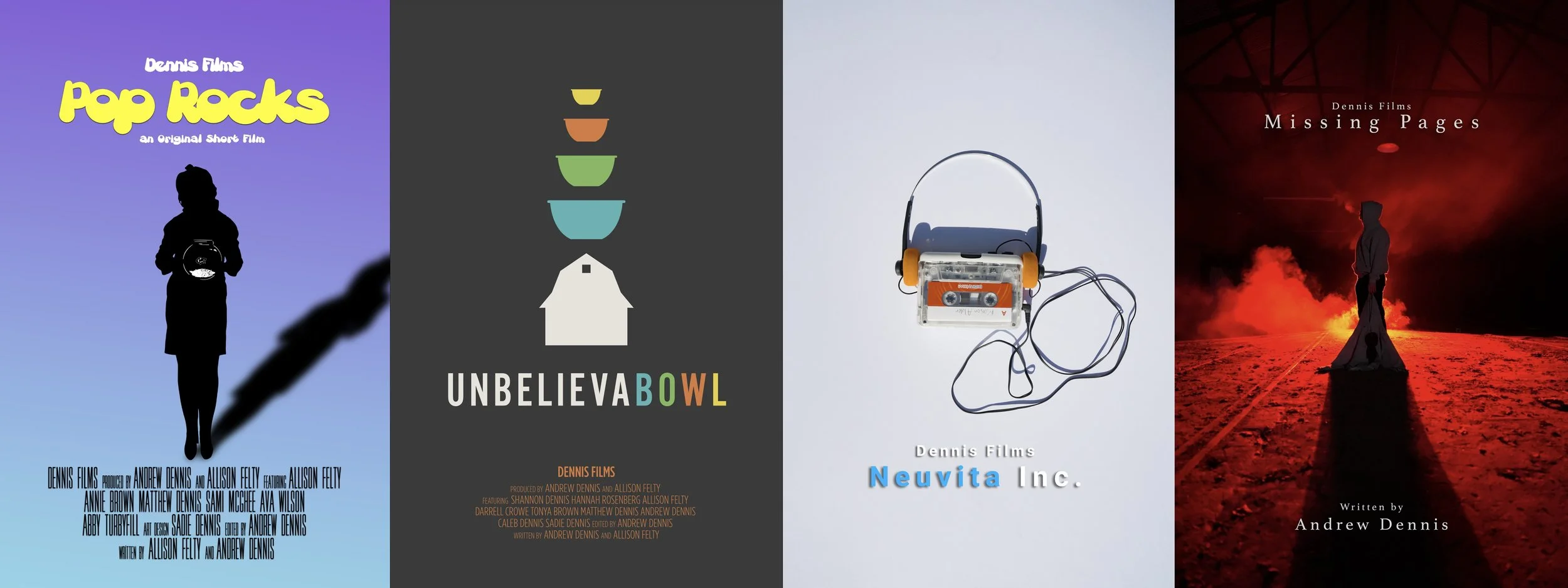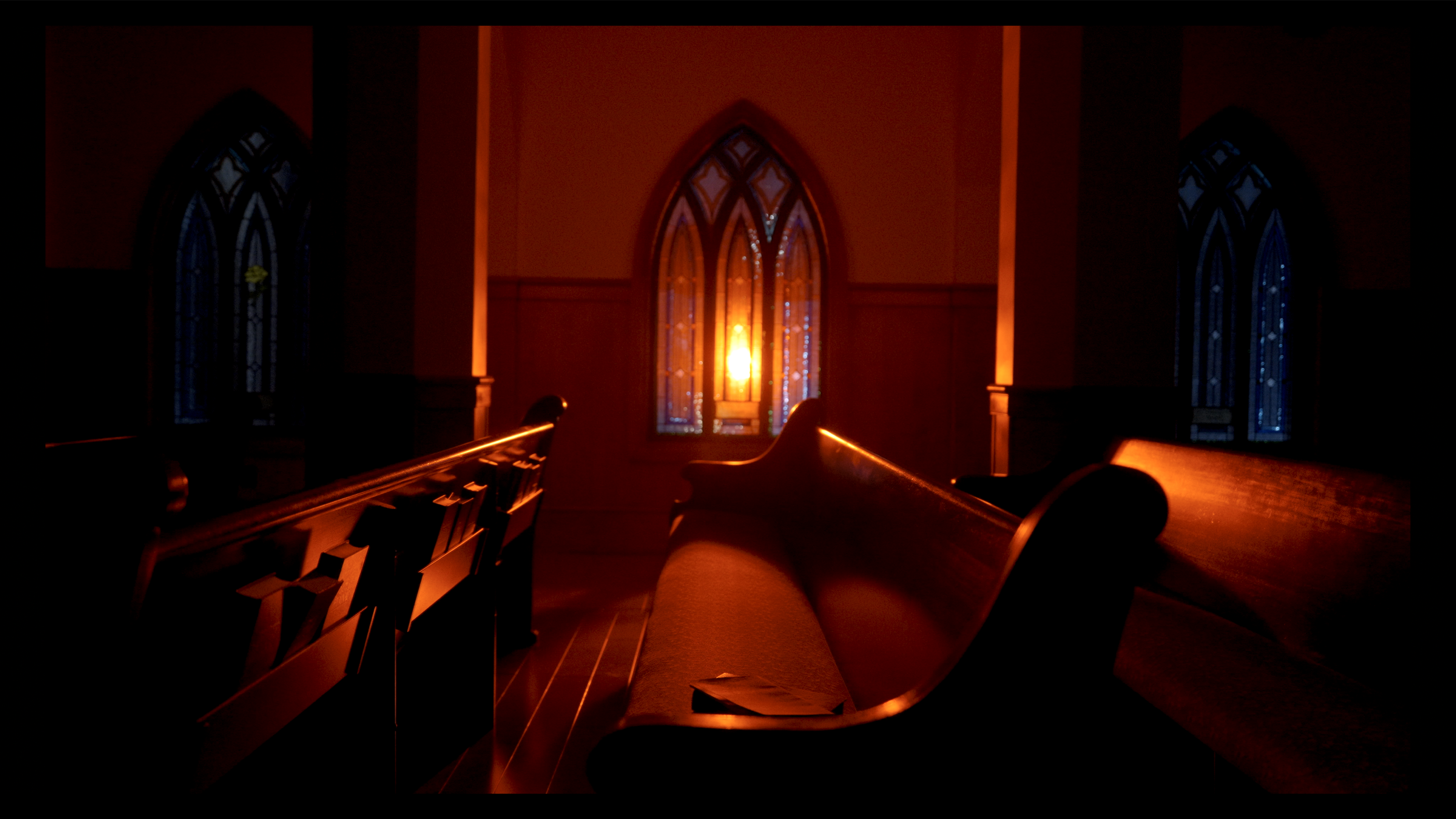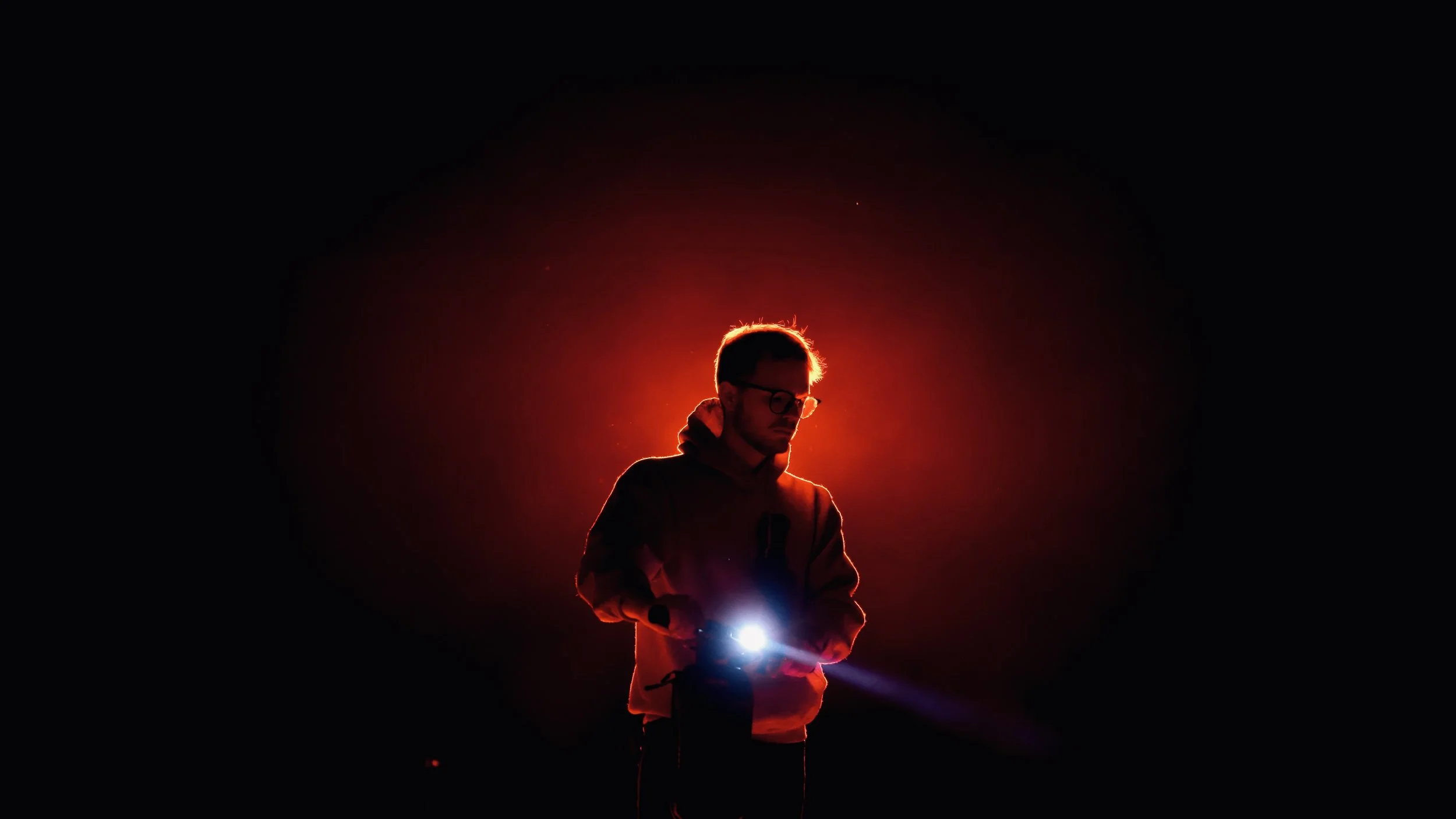Memory, Mystery, and Missing Pages: Andrew Dennis
Welcome Andrew, we are very excited to have you today with us to discuss about your work.
Who is Andrew Dennis and how did the passion for creating begin?
I’m an indie filmmaker with a deep passion for storytelling. It’s been in me for as long as I can remember. Ever since I was a kid, I’ve been finding ways to create—from recording silly skits on tape with my brothers to making comic books and holding living room “premieres” for my family. When I was ten, my parents got me my first camcorder, and I couldn’t put it down. I fell in love with the magic of capturing moments and shaping them into stories. I was also heavily involved in theatre, which helped me understand emotion and acting on a deeper level. Storytelling, in any form, has always felt like home to me—it’s how I connect, express, and make sense of the world. You can even see me in old home videos begging to use the camera. I feel I was born to make movies.
Can you tell us a bit about your previous work?
I began focusing on short narratives in middle school, which eventually evolved into Dennis Films. Early hits among friends and family included Arnold, Broken Boundaries, and The Cow Guardian. After college, I searched for a clearer voice and brand. During the pandemic, I entered what I call “The Dennis Brothers’ Era,” filled with shorts like Phobia Phobia and our #ThursdayNights episodes—a season full of heart and laughter.
After relocating, I reconnected with old friends and created Freakin’ Fantasy, which sparked a desire to refine our storytelling. That led to Pop Rocks—a quirky, fun, and darkly humorous short that felt like a creative breakthrough. But it was UnbelievaBowl, made for the Southern Oasis Film Festival in Tennessee, that truly lit the fire. When I rendered the final cut, I was overwhelmed with emotion. I knew we had found something we’d been chasing for years. Seeing it on the big screen with my team is a moment I’ll never forget.
Now, our latest projects—Missing Pages and Neuvita Inc.—are cycling through festivals. Each new film builds on the heart, experimentation, and growth that’s been at the core of Dennis Films since the very beginning.
Andrew, you’ve described film as your "bloodline and heartbeat." When you first envisioned Missing Pages, did it feel like it was always inside you, waiting to surface?
This film may have surfaced recently, but what I came to know is that It’s been building in me since childhood— navigating through life, love, loss, family, and religion.
“If you and your family keep burying secrets, it will destroy you.” Those were the words my grandfather, James McNeil, spoke to me in a vivid dream years after he passed in 2012. In the dream, he was in a hospital bed, and I was alone in the room with him—I’ve never forgotten it.
Missing Pages is the first film I’ve made that comes purely from the heart. It was born from pain, heartbreak, and deep confusion. I think of that dream often—how easily we suppress the things we’re afraid to talk about, even as kids. Why do we equate strength with silence? It can destroy us. Missing Pages opened the door for tough, but freeing conversations with my friends and family.
The film has healed me, saved me, and even now is continuing to do so. Making this film confirmed for me that storytelling is what I was born to do. No matter what, I feel the happiest, safest, and most on fire when I’m filming.
CONVERSATION ABOUT: '‘Missing Pages''
You explore the idea that peace is found not in answers, but in accepting the unknown. Was there a specific moment in your life that sparked this revelation?
There were several deeply personal moments in 2024 where things I believed to be true—relationships, memories, parts of my identity—suddenly unraveled. My personal life, family, and creativity collided. I had never experienced such confusion, such disconnection from myself. I couldn’t figure out what was fully real and what wasn’t.
I was broken, lost, and desperately wanted to find myself again. I isolated myself and deeply reflected on my life. In that isolation, in my confusion, the only thing that felt steady, safe, and real, was my love for film. Missing Pages was also birthed from survival. It was the first time I made a film solely for myself—to preserve what I could no longer define, to make something real out of the blur.
I spent that time confronting the parts of myself I had silenced for years: the people-pleasing, my insecurities, the need to earn love. I also quietly wrestled with faith and meaning, asking questions I never had the courage to ask before. The answers didn’t come easily—and some still haven’t.
But in the pain, and in the healing, I learned how to love deeper, and understand the world just a little bit better.
Missing Pages taught me that not all wishes whispered into the dimly lit birthday candles on a cold night, come true—and maybe that’s not the tragedy I once thought it was. Sometimes, letting go of the wish is where the real peace begins.
Symbolism plays such a vivid role in Missing Pages — were there any symbols that surprised even you as you were creating the film?
What surprised me most was how powerful the simple things became—how, in the middle of an identity crisis, simple things suddenly became anchors, a childhood pet, unconditional love of family, echoing voices from a familiar choir. These small, gentle glimpses of my life became safe places when nothing else felt solid.
When you go through this type of crisis, it feels like your brain is glitching between versions of who you were, who you are, and who you’re becoming. Reality is blurred and you cling to anything that still feels true.
For me, that meant creating something real out of what I believed was beautiful. Every symbolic element in Missing Pages became a mission to rescue sacred memories and give them a place to live. This film helped me reclaim treasured memories that meant the world to me—moments that once brought so much joy, but that time and pain had complicated. Through the process, I was able to honor them again. To remember them as they were: beautiful.
I discovered that joy, love, and pain can all exist within the same memory. The same place that holds your heartache, can also hold your healing—if you let it.
Was there an unconventional technique — in cinematography, editing, or storytelling — that you dared to try for the first time in Missing Pages?
I’m usually the one behind the camera—but for Missing Pages, I had to let that go. My dear friends Abby Turbyfill and Allison Felty took over, helping me visually capture one of the most vulnerable journeys I’ve ever taken. The memories, laughter, and tears during this production, with those two by my side, is something I’ll cherish forever.
I was incredibly nervous to be in front of the camera for a whole film, especially navigating my way out of deep, painful insecurities. There was a point before the film, and I think we’ve all experienced this, where I looked in the mirror, picked apart everything I thought was disgusting about myself, and walked away. By the time I began filming Missing Pages, I was ready to face myself again.
What makes this film unconventional is that we created something deeply personal and beautiful with a cast and crew of just three. Locations fell through, only for better ones—places we never thought we could secure—to appear at the last moment. Before I premiered Missing Pages to anyone else, I watched it with Abby and Allison, and from then on this film is continuing to change my life.
What reactions do you hope to elicit from audiences watching your project ?
When I write films, I always think about how I want my audience to feel. With Missing Pages, I wrote it for myself—but still hoped it would connect with others. I left a subtle narrative so people from all backgrounds, beliefs, and values could see themselves in it.
What’s been surprising is how many people are resonating with it. The feedback has made me feel less alone. It reminds me that we’ve all been in moments where we had to find peace in simply not having all the answers—and there’s a strange freedom in that.
That’s what I hope audiences walk away with… not a clear resolution, but a newfound strength, to keep moving forward in the dark. An emotional response. A reminder that the unknown doesn’t have to be feared; instead, the unknown can be embraced as the catalyst needed to inspire change and birth hope.
In future projects, do you plan to explore similar genre intersections, or are there other genres you're eager to explore ?
My team and I have discovered that we grow the most when we’re pushed outside of our comfort zones. At Dennis Films, we plan to explore a wide range of genres—eventually taking a stab at all of them. What matters most to us, regardless of genre, is the emotional takeaway. We want our audiences to leave the theater feeling better than when they came in.
There’s a lot of power in that. I’ve seen plenty of beautifully made films that left me feeling heavy or unsettled—but the ones that stayed with me the longest were the ones that inspired me to keep fighting for myself, for my soul. Our pain, our broken hearts, the darkness of this world is constantly trying to take away are innocence, our compassion, and our identity. I want our audiences to fight for themselves, to fight to keep their inner child alive.
What’s one “missing page” from your own creative journey that you now realize was essential to your growth?
Although it sounds cliché, it took me years to learn how to truly love myself. How can you love anything—or anyone—if you don’t love yourself first? Before Missing Pages, I used to think that idea sounded arrogant. Now, I understand. My insecurities and lack of belief in myself hurt my relationships, my creativity, my drive, and ultimately, me. That was my “missing page.”
Finding it softened my heart—and more importantly, taught me how to protect it. I didn’t expect that self-love would lead me to a deeper compassion and love for the people around me, including those who’ve hurt me.
Facing yourself—your darkest fears, your insecurities—is easily one of the hardest things I’ve ever done. It’s an ugly, agonizing, but sacred process. I’ve grown so much because of it. I found out who is truly in my corner, and I’ve started to learn what truly matters in life. I still feel lost in many ways, even as I write this, but that’s okay.
That page, once missing, helped complete me in this season of life. It helped rise back up. It’s helped me figure out what’s real—and let go of the rest.
This marks the conclusion of the interview featuring our esteemed artist, Andrew Dennis. Our community is growing steadily, with a continuous influx of skilled filmmakers and screenwriters joining us. Explore our other interviews, and consider scheduling one for yourself to showcase your creative endeavors.







